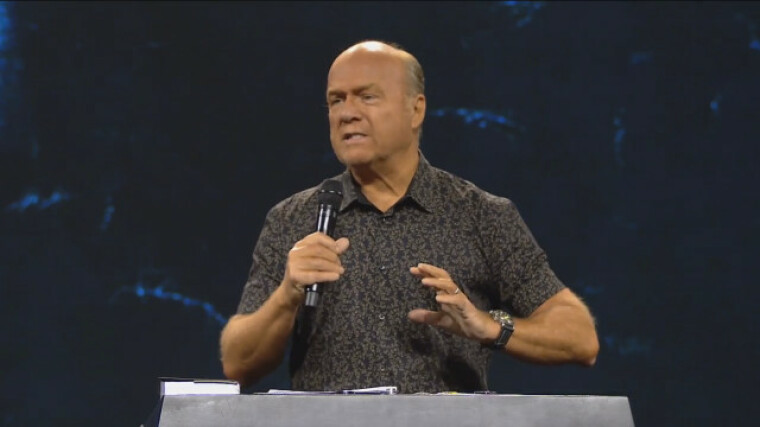Greg Laurie says talking about heaven helps him cope with grief on difficult days

Greg Laurie, a senior pastor at Harvest Christian Fellowship, talked about how he deals with the loss of a son, especially on difficult days such as birthdays, Christmas and Easter. He shared that channeling his grief to helping others overcome theirs and talking about heaven have helped him survive all these years.
In a Facebook post, the evangelist revealed that at first, he was not keen on joining a club of parents who have lost children. Eventually, however, he found it therapeutic to talk about heaven as it allows him to think of where his son currently is and to cry with others as they spoke about their own tragedies. He is thankful to God that he and his wife, Cathe, are given an opportunity to inspire and spark hope in others who are dealing with grief same as theirs.
Laurie wrote, "Despite this pain and tragedy, if we can bring a little hope or a little comfort to someone else, then I am thankful God has allowed us to have some joy despite this tragedy."
Laurie lost his eldest son, Christopher, then 33, in a car accident in Corona, California in July 2008. The young Laurie was on his way to Harvest Christian Fellowship, where he served as art director, in Riverside, California, when his vehicle collided with a California Department of Transportation tractor.
Since the passing of his son, heaven has become a frequent topic in the pastor's sermons and written pieces. He admits, however, that he is more of a student of heaven rather than an expert.
In a blog entry in January 2016, Laurie revealed that he is skeptical whenever somebody claims that he has been to heaven. He emphasized that his beliefs are founded on the only "authoritative source" that he knows of — Jesus Christ.
"I think our belief in heaven should affect us while we live on Earth. Our belief in the afterlife has a lot to say about how we live in the before life, how we live in the here and now. The way we view the by-and-by affects us in the here and now," he wrote.
 Christians don't have to affirm transgenderism, but they can’t express that view at work: tribunal
Christians don't have to affirm transgenderism, but they can’t express that view at work: tribunal Archaeology discovery: Medieval Christian prayer beads found on Holy Island
Archaeology discovery: Medieval Christian prayer beads found on Holy Island Presbyterian Church in America votes to leave National Association of Evangelicals
Presbyterian Church in America votes to leave National Association of Evangelicals Over 50 killed in 'vile and satanic' attack at Nigerian church on Pentecost Sunday
Over 50 killed in 'vile and satanic' attack at Nigerian church on Pentecost Sunday Ukrainian Orthodox Church severs ties with Moscow over Patriarch Kirill's support for Putin's war
Ukrainian Orthodox Church severs ties with Moscow over Patriarch Kirill's support for Putin's war Islamic State kills 20 Nigerian Christians as revenge for US airstrike
Islamic State kills 20 Nigerian Christians as revenge for US airstrike Man who served 33 years in prison for murder leads inmates to Christ
Man who served 33 years in prison for murder leads inmates to Christ


 Nigerian student beaten to death, body burned over ‘blasphemous’ WhatsApp message
Nigerian student beaten to death, body burned over ‘blasphemous’ WhatsApp message 'A new low': World reacts after Hong Kong arrests 90-year-old Cardinal Joseph Zen
'A new low': World reacts after Hong Kong arrests 90-year-old Cardinal Joseph Zen Iran sentences Christian man to 10 years in prison for hosting house church worship gathering
Iran sentences Christian man to 10 years in prison for hosting house church worship gathering French Guyana: Pastor shot dead, church set on fire after meeting delegation of Evangelicals
French Guyana: Pastor shot dead, church set on fire after meeting delegation of Evangelicals ‘Talking Jesus’ report finds only 6% of UK adults identify as practicing Christians
‘Talking Jesus’ report finds only 6% of UK adults identify as practicing Christians Mission Eurasia ministry center blown up in Ukraine, hundreds of Bibles destroyed: 'God will provide'
Mission Eurasia ministry center blown up in Ukraine, hundreds of Bibles destroyed: 'God will provide' Church holds service for first time after ISIS desecrated it 8 years ago
Church holds service for first time after ISIS desecrated it 8 years ago Burger King apologizes for 'offensive campaign' using Jesus' words at the Last Supper
Burger King apologizes for 'offensive campaign' using Jesus' words at the Last Supper Uganda: Muslims abduct teacher, burn him inside mosque for praying in Christ’s name
Uganda: Muslims abduct teacher, burn him inside mosque for praying in Christ’s name